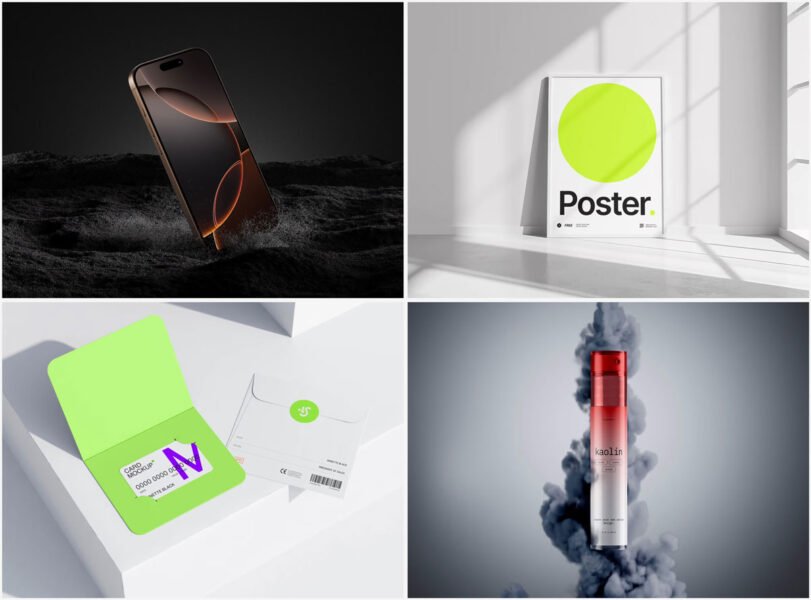Skip to the good bit
ToggleThe Visual Nature of Investor Decisions
When founders pitch their ideas, every detail counts—from the numbers in the deck to the design of the slides. Yet time and again, research and anecdotal evidence show that investors respond most strongly to visuals. A clean and professional presentation is often the difference between being remembered and being forgotten. This is where free mockups become powerful tools. They allow small teams and startups to communicate product value visually, even before physical prototypes exist.
Investors are busy. They scan dozens of pitch decks weekly. Visual storytelling helps a project stand out instantly. A flat logo in a corner looks uninspiring, but that same logo displayed on a polished notebook mockup suddenly communicates brand identity, usability, and readiness for scale.
Why Free Mockups Drive Investor Confidence
Mockups provide context that raw sketches or plain wireframes cannot. A packaging design placed into a real-life photo setting, for example, shows how the product will sit on a store shelf. An app design displayed on an iPhone mockup makes the interface feel tangible. This bridges the gap between concept and execution, helping investors visualize adoption in the real world.
There are several psychological factors at play:
-
Investors trust projects that look “market-ready,” even if they’re still in early stages.
-
Visuals trigger emotional responses faster than words or spreadsheets.
-
Seeing a design in context reduces the cognitive effort required to imagine the end product.
By reducing uncertainty and increasing clarity, mockups elevate the pitch’s perceived professionalism.
Real Examples of Free Mockups in Action
Consider a small startup designing eco-friendly water bottles. Rather than showing a flat PDF design, the founder presents the design wrapped around a realistic bottle mockup. Investors not only see the logo placement but also imagine how the bottle would appeal on a retail shelf.
Another example: a fintech app prototype. Instead of showing wireframes, the pitch deck uses a smartphone mockup with the app’s screens. The investor instantly understands the interface flow, usability, and branding. That small shift from flat visuals to immersive mockups creates trust and excitement.
Even non-product startups can benefit. A B2B SaaS platform might present its pitch with branded stationery mockups, showing the professionalism of its identity system. The design context creates a sense of credibility.
Where to Find High-Quality Free Mockups
Not all mockups are created equal. Low-resolution or clumsy files can have the opposite effect, making a pitch look rushed. That’s why sourcing from trusted providers is essential. The website ls.graphics offers a wide selection of high-quality free mockups across categories like packaging, devices, branding, and apparel. Their mockups are built with attention to detail, layered PSDs, and smart objects that make customization easy, even for teams without advanced design skills.
With these, a startup can prepare an entire investor pitch deck polished enough to rival larger competitors—without spending heavily on design resources.
How Teams Use Free Mockups Strategically
The most successful teams don’t just sprinkle mockups randomly. They integrate them into their storytelling arc. For example:
-
Cover slide: Company logo presented on a professional brand mockup.
-
Problem/Solution slide: Product shown in context via device or packaging mockups.
-
Market slide: Lifestyle mockup demonstrating target customers using the product.
-
Closing slide: Branded stationery mockup reinforcing identity and seriousness.
This structured approach keeps visuals consistent, reinforces brand presence, and leaves investors with a vivid impression of the product’s potential.
Final Thoughts
Investors are not just buying into a financial model; they are buying into a vision. Free mockups transform abstract ideas into concrete, believable experiences. They shorten the distance between “this could work” and “I can see this on the market tomorrow.”
For small teams and startups with limited resources, leveraging free mockups from platforms like ls.graphics is not just a design shortcut—it’s a strategic advantage. By presenting ideas in polished, contextual visuals, founders create confidence, excitement, and a competitive edge in the eyes of investors.







